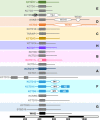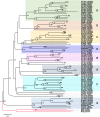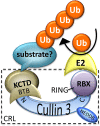KCTD: A new gene family involved in neurodevelopmental and neuropsychiatric disorders
- PMID: 31197948
- PMCID: PMC6566181
- DOI: 10.1111/cns.13156
KCTD: A new gene family involved in neurodevelopmental and neuropsychiatric disorders
Abstract
The underlying molecular basis for neurodevelopmental or neuropsychiatric disorders is not known. In contrast, mechanistic understanding of other brain disorders including neurodegeneration has advanced considerably. Yet, these do not approach the knowledge accrued for many cancers with precision therapeutics acting on well-characterized targets. Although the identification of genes responsible for neurodevelopmental and neuropsychiatric disorders remains a major obstacle, the few causally associated genes are ripe for discovery by focusing efforts to dissect their mechanisms. Here, we make a case for delving into mechanisms of the poorly characterized human KCTD gene family. Varying levels of evidence support their roles in neurocognitive disorders (KCTD3), neurodevelopmental disease (KCTD7), bipolar disorder (KCTD12), autism and schizophrenia (KCTD13), movement disorders (KCTD17), cancer (KCTD11), and obesity (KCTD15). Collective knowledge about these genes adds enhanced value, and critical insights into potential disease mechanisms have come from unexpected sources. Translation of basic research on the KCTD-related yeast protein Whi2 has revealed roles in nutrient signaling to mTORC1 (KCTD11) and an autophagy-lysosome pathway affecting mitochondria (KCTD7). Recent biochemical and structure-based studies (KCTD12, KCTD13, KCTD16) reveal mechanisms of regulating membrane channel activities through modulation of distinct GTPases. We explore how these seemingly varied functions may be disease related.
Keywords: KCTD11; KCTD13; KCTD7; Neurodegeneration; Neurodevelopmental disorders.
© 2019 The Authors. CNS Neuroscience & Therapeutics Published by John Wiley & Sons Ltd.
Conflict of interest statement
The authors have no conflicts of interest to declare.
Figures




References
-
- Skoblov M, Marakhonov A, Marakasova E, et al. Protein partners of KCTD proteins provide insights about their functional roles in cell differentiation and vertebrate development. BioEssays. 2013;35(7):586‐596. - PubMed
-
- Ji AX, Chu A, Nielsen TK, Benlekbir S, Rubinstein JL, Prive GG. Structural insights into KCTD protein assembly and cullin3 recognition. J Mol Biol. 2016;428(1):92‐107. - PubMed
-
- Bayón Y, Trinidad AG, de la Puerta ML, et al. KCTD5, a putative substrate adaptor for cullin3 ubiquitin ligases. FEBS J. 2008;275(15):3900‐3910. - PubMed
Publication types
MeSH terms
Substances
Grants and funding
LinkOut - more resources
Full Text Sources
Molecular Biology Databases

